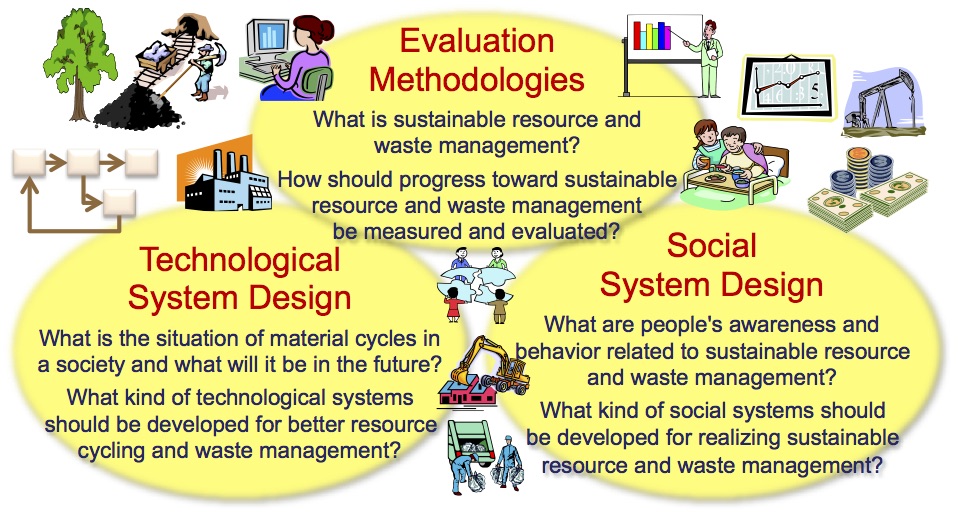

Evaluation Methodologies and System Design for "Cycle-Oriented Society (Sustainable Resource and Waste Management)"
"Cycle-Oriented Society (循環型社会)" is a term to describe a vision of a society toward a sustainable world. Not only does it designate sound cycles of resources and wastes symbolized by 3Rs (Reduce, Reuse and Recycle); it expresses a broader vision including sound cycles of carbon and nutrients in nature and cycles of relationship in a society. Development of a socioeconomic system that uses limited earth resources cyclically at an appropriate level is an important task to achieve a sustainable society, given an increasing and increasingly wealthy global population. What are such technological and social systems like? Our laboratory strives to conduct research that contributes to the development of a "Cycle-Oriented Society" or "sustainable resource and waste management" from the viewpoint of a systems analysis approach. The following research questions are addressed:

If a "Cycle-Oriented Society" is a goal to reach for, then we need to check our progress through measuring and evaluating whether we are approaching such a society, using indicators. On the other hand, for establishing indicators, it is necessary to define what a "Cycle-Oriented Society" or "sustainable resource and waste management" is, and what key factors are. We therefore try to carry out analysis related to the ideal description of a "Cycle-Oriented Society", and try to develop methods to measure and evaluate progress toward sustainable resource and waste management. Representative research outputs include comparative analysis of images of "Cycle-Oriented Society" and development of six indicators of material cycles for describing society's metabolism.

To realize a "Cycle-Oriented Society" or "sustainable resource and waste management", we must examine what technological systems should be introduced to offer improvements in material cycling. Understanding the situation of current material cycles in a society and exploring its scenarios for the future are prerequisites for this examination. Therefore, we strive to understand material flows in a society and to carry on future scenario analysis (material flow analysis: MFA), and to conduct environmental evaluation of technological systems related to resource cycling and waste management (life cycle assessment: LCA). Representative research outputs include MFA of construction minerals and LCA for plastic containers and packaging recycling.

People's awareness is an important factor for a social change. Even if there is a desirable resource cycling technological system, it will not be realized without cooperation among people. Creation of economic incentives such as unit pricing for garbage, and legal systems such as various recycling laws, have been introduced, but they still have much room for improvements. Therefore, we carry on analysis of awareness and behavior related to a "Cycle-Oriented Society" or "sustainable resource and waste management", and analysis of social systems to support the creation of a society or management. Representative research outputs include an analysis of methods to promote collection of small electrical and electronic equipment and an analysis of incentives in the National Greenhouse Gas Inventories.
